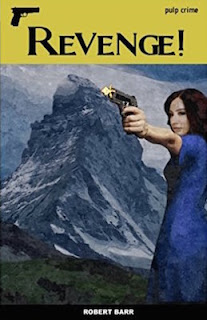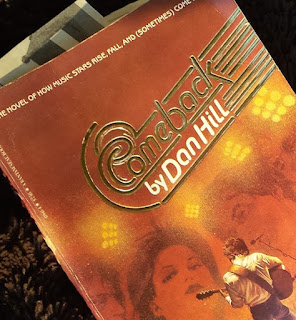Revenge!
Robert Barr
[n.p.]: Dodo, [n.d]
240 pages
A collection of short stories united by a common theme, Revenge! was one of Robert Barr's best received books. This anonymous review from the 26 November 1896 issue of Public Opinion is typical:
Under the comprehensive title of "Revenge," Robert Barr collects a score of the wildest flights of his imagination, which land us in all sorts of places. Horrors dire lie cheek by jowl with the broadest of farces. All tastes are suited save those the readers who wish to derive moral benefit from their literary pabulum, for there is not a scrap of moral to be extracted, although one can be invented to fit almost anywhere.The first American edition, with illustrations by Lancelot Speed, Stanley Wood, and G.G. Manton, is a thing of beauty. I wanted a copy for years, I searched for a copy for years, and in the end settled for this crummy print on demand thing from Dodo Press. I'm glad I did because Revenge! was not only this summer's favourite read, but it renewed my interest in its author.
Barr was a better stylist than his contemporary Grant Allen, whom I describe in my new book (plug) as Victorian Canada's greatest novelist, but I'd long believed Barr lagged far behind his rival in weaving a good yarn.
I was wrong.
The stories in Revenge! are "wonderfully clever" – I quote Douglas Sladen (Literary Review, 23 October 1896) – the suspense, black humour, and twists remind me of nothing so much as Tales of the Unexpected, which so captivated as a kid.
Revenge! has twenty stories, all of which would've fit well in Roald Dahl's series. The first, "An Alpine Divorce," is one of Barr's most anthologized, which is not to say it is well-known. Because we never read it in school, what follows will likely spoil things.
As the title suggests, "An Alpine Divorce" concerns marital discord. It begins:
In some natures there are no half-tones; nothing but raw primary colours. John Bodman was a man who was always at one extreme or the other. This probably would have mattered little had he not married a wife whose nature was an exact duplicate of his own.With all divorces one must pick a side. I chose to be with Mrs Bodman (she has no Christian name), but as the tale progressed she fell out of favour.
Things are set in motion when John Bodman books a holiday in the Swiss Alps. Saying nothing, his wife sets about preparing for the journey. At some point – the narrator is unsure as to just when – John gets the idea that a nearby picturesque outlook would be the perfect place to dispose of his wife. They'll hike there together – Mrs Bodman always insists on accompanying him everywhere – and he'll simply push her over the outlook's crumbling wall.
Set out they do, in a scene that affords the reader the first and only glimpse of their married life. As the couple approach their destination, the wife pauses. "John," she asks, "don't you think that if you had been kinder to me at first, things might have been different?":
"It seems to me," he answered, not looking at her, "that it is rather late in the day for discussing that question."Mrs Bodman becomes increasingly agitated:
"I have much to regret," she said quaveringly. "Have you nothing?"
"No," he answered."
"Very well," replied his wife, with the usual hardness returning to her voice. "I was merely giving you a chance. Remember that."
Her husband looked at her suspiciously. "What do you mean?" he asked, "giving me a chance? I want no chance nor anything else from you. A man accepts nothing from one he hates. My feeling towards you is, I imagine, no secret to you. We are tied together, and you have done your best to make the bondage insupportable."
"Yes," she answered, with her eyes on the ground, "we are tied together, we are tied together!"
"Why do you walk about like a wild animal?" he cried. "Come here and sit down beside me, and be still." She faced him with a light he had never before seen in her eyes — a light of insanity and of hatred.Bloody hell! What an ending!
"I walk like a wild animal," she said, " because I am one. You spoke a moment ago of your hatred of me; but you are a man, and your hatred is nothing to mine. Bad as you are, much as you wish to break the bond which ties us together, there are still things which I know you would not stoop to. I know there is no thought of murder in your heart, but there is in mine. I will show you, John Bodman, how much I hate you."
The man nervously clutched the stone beside him, and gave a guilty start as she mentioned murder.
"Yes," she continued, "I have told all my friends in England that I believed you intended to murder me in Switzerland."
"Good God!" he cried. "How could you say such a thing?"
"I say it to show how much I hate you — how much I am prepared to give for revenge. I have warned the people at the hotel, and when we left two men followed us. The proprietor tried to persuade me not to accompany you. In a few moments those two men will come in sight of the Outlook. Tell them, if you think they will believe you, that it was an accident."
The mad woman tore from the front of her dress shreds of lace and scattered them around.
Bodman started up to his feet, crying, "What are you about?" But before he could move toward her she precipitated herself over the wall, and went shrieking and whirling down the awful abyss.
Now, I warned you I was going to spoil things. I did so because I wanted to give a sense of why Revenge! is worthy of attention. A collection of well-crafted, imaginative, disturbing, entertaining tales, it is the best Victoria's Canada offered. There are nineteen more tales – some better, some worse, most on equal footing.
Give it a read. Do not wait for next summer; it is a book for all seasons. I'm betting Roald Dahl would agree.
A query: The 14 November 1896 Atheneum has it that "An Alpine Divorce" was likely suggested by an "'over-true' tale of some years since." Does anyone have an idea as to the incident the reviewer is referencing?
A second query: "An Alpine Divorce" is one of two Revenge! stories to feature suicide, and murder features in most, but not all are touched by death. An example of this last is "The Bromley Gibberts' Story," which Sladen likens to a roman à clef, adding "it is hard not to think that the alphabetical resemblance of the hero's name to that of a well-known novelist of the day is entirely accidental, or that the resemblance of the name Shorely to that of one of the cleverest and most popular of our editors is purely fortuitous."
I have no idea just who he's on about. Do you?
Of all the print on demand vultures, Dodo has the nicest cover – that's James Tissot's July: Specimen of a Portrait (1878). The strangest positions Robert Barr as a pulp writer, and reimagines Mrs Bodman as a woman who knows how to handle a gun.
The 1896 Stokes first edition I searched for isn't horribly expensive, but it exceeds my current budget. Copies begin at US$65 and, for no good reason, reach US$500. "Tastefully stamped with silver and colors," says the ad in the November 1896 edition of the Pocket Magazine. I've seen copies on yellow, red, green, and tan boards, with no indication as to which, if any, is the true first. A yellow copy of the Stokes edition can be read online here – gratis – at the Internet Archive.
An English edition was published the same year by Chatto & Windus.
Held by nine Canadian university libraries. All our public libraries fail.
























